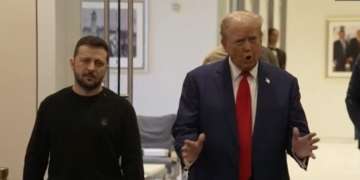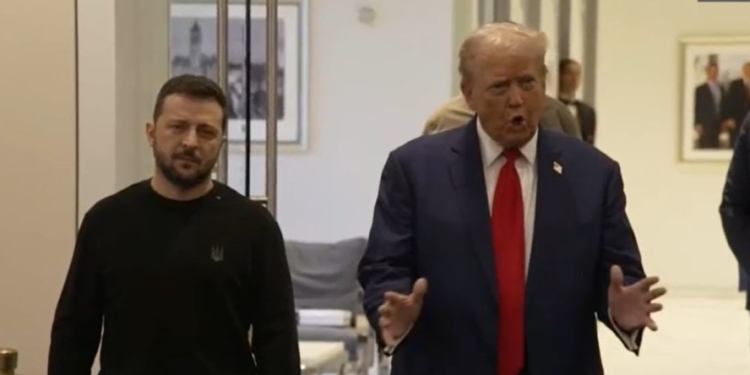President Donald Trump has never been one to shy away from bold statements, but his recent comments on Russia and Ukraine have left even his supporters scratching their heads. He’s called Ukrainian President Volodymyr Zelensky a dictator. He’s labeled Russian President Vladimir Putin a friend. He’s even suggested Ukraine started the war that’s ravaged its land since 2022.
Why is Trump doing this? He’s not stupid. He’s not uninformed. Yet he’s doubling down on rhetoric and actions that have drawn criticism from across the political spectrum. Is it possible that Trump is playing a game that’s different from the one we’re seeing?
If so, he may be vindicated by Tuesday’s announcement that Ukraine and the U.S. agreed to share revenue from some of Ukraine’s mineral sources.
To explore this further, let’s step back in time to a story about another president who behaved in ways that puzzled friend and foe. The late Jim Billington, when he was librarian of Congress, told me this story about former President Dwight D. Eisenhower.
It was 1955, and Eisenhower was up against a crisis that threatened to spiral into war between China and the US. China had begun shelling the offshore islands of Quemoy and Matsu, testing America’s resolve under its Mutual Defense Treaty with Taiwan. In responding to this provocation, Eisenhower had to juggle three audiences with conflicting demands. Europe wanted reassurance that the U.S. wouldn’t ignite a global conflict. The Chinese Communists needed to be made aware that America wasn’t going to back down. And congressional hawks, some itching to “bomb Red China yesterday,” demanded a show of strength.
Days before a critical press conference about the Quemoy Matsu crisis, Eisenhower gave his speechwriters the job of crafting a message that could satisfy all three requirements. Two days before the press conference, the speech writers admitted defeat: they could meet any two of Eisenhower’s three goals, but satisfying all three of the requirements was an impossibility. Eisenhower responded to them with, “Well, I guess I’m on my own.”
Billington knew Eisenhower and was privy to all this. When the press conference took place Billington was on tenterhooks about what would happen. The stakes were war and peace.
According to Billington, Eisenhower began his press conference boldly: “It is the position of the United States that we will…”—and then he trailed off into a mumble, delivering a string of incomprehensible sentences. He continued, “Furthermore, the world needs to know that…”—and then more mystifying mutterings followed.
To the press and much of the world, Eisenhower looked like a doddering old man.
Billington was puzzled by Ike’s performance. “You’re one of the most articulate men I’ve ever met,” Billington said to Ike. “How come the press conference went like that?” Eisenhower’s response was revealing. Ike answered words along the lines of, “They can think me a fool, but it’s a small price to pay to keep war off the table.”
The confusion calmed Europe, kept China guessing and stopped Congress from forcing Eisenhower’s hand. The world saw a bumbling old man; Eisenhower saw a way to thread an impossible needle.
Could Trump be pulling a similar move? We know that ending the Ukraine war rapidly has been a cornerstone of Trump’s promises. To make that happen, he needs Putin at the negotiating table.
Trump understands that he’s not going to get this by calling Putin names. But he also understands that once at the table, Putin has a weak hand. His military is stalled, ethnic tensions simmer, Russia’s economy is fragile and sanctions are escalating.
Meanwhile, Trump also knows that the Ukrainians, weary from losses, might now accept a compromise they’d have rejected years ago—trading land for peace. A phrase you can hear frequently in Kyiv today is, “We can get territory back, maybe in 30 years, but we can never get lost lives back.” If Trump can broker a deal that preserves Ukraine’s core integrity, he’d stop a war that no one else could.
So why the nice words for Putin? Why call Zelensky a dictator? Why vote with Russia against the UN resolution condemning Russian aggression in Ukraine? Could all this be strategic flattery, a page from his own negotiation playbook: understand what the other side wants and needs, offer it, and only then work toward the hard bargain that’s the real goal.
Trump knows that Putin’s built his image on strength and defiance. For Putin to negotiate on Ukraine, he’d need to avoid looking like he’s caving to America. Trump’s praise—calling him a “strong leader” or touting their “businesslike” relationship—frames talks as a meeting of equals, not a surrender. Face-saving words, and giving Putin something that he can take back to his own country that shows that he’s still a strong man, might just be the only way to get Putin to the table.
Is Trump knowingly taking a global PR hit to set this up? The Eisenhower parallel suggests it’s possible. Like Ike, he might be willing to look foolish—or worse—if it gets him what he really wants: an end to the war and a geopolitical win. For that matter, could he be aiming even higher—say, peeling Russia away from China? A Russia less tethered to Beijing would shift the global balance in America’s favor. It’s a long shot, but Trump’s never lacked ambition.
Critics argue he’s just cozying up to a dictator. Yet Trump’s focus seems less on idolizing Putin and more on ending the conflict. If he thought insults worked better, he’d probably use insults—he’s never been shy about trashing foes. The nice talk feels like a means to an end. Harsh rhetoric might make Putin dig in, proving his resolve to his domestic base. Flattery, though, could coax him into talks where Trump can push for concessions, allowing Putin to claim a diplomatic “win” at home.
Is this the game Trump’s playing? It’s hard to say for sure. Trump is bleeding support over this—even Trump loyalists are balking. But maybe that’s the point. For this approach to work, it has to be believable. Eisenhower took the hit of being called a fool to avoid war. Trump might be gambling that a few wild statements now will pay off later.
If he pulls it off—getting Putin and Zelensky to the table, stopping the war, maybe even disrupting the Russia-China axis—it would have been worth it. The world might see chaos now, but for Trump it may actually be strategy.
A big question emerges: is Trump a blusterer out of his depth, or a tactician hiding in plain sight? Only the outcome will tell.
Mitzi Perdue is a journalist reporting from and about Ukraine
The views and opinions expressed in this commentary are those of the author and do not reflect the official position of the Daily Caller News Foundation.
All content created by the Daily Caller News Foundation, an independent and nonpartisan newswire service, is available without charge to any legitimate news publisher that can provide a large audience. All republished articles must include our logo, our reporter’s byline and their DCNF affiliation. For any questions about our guidelines or partnering with us, please contact [email protected].



























 Continue with Google
Continue with Google